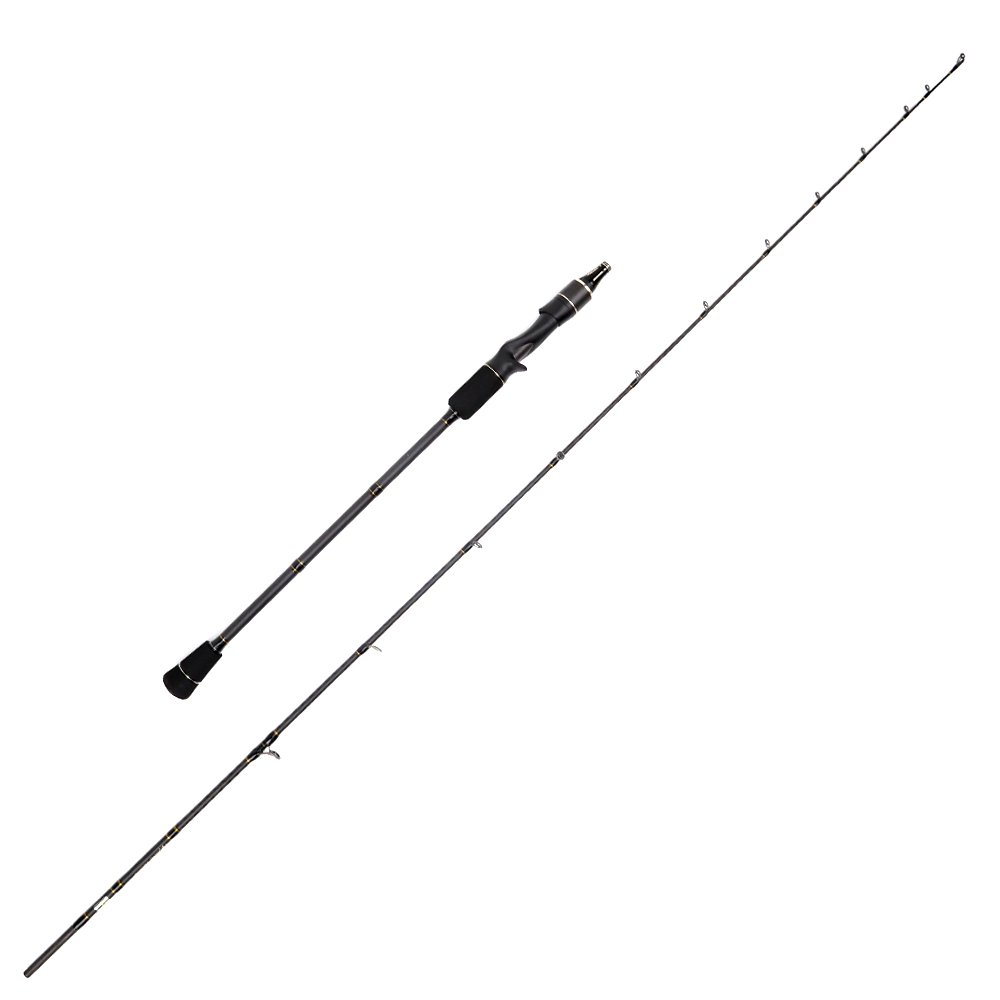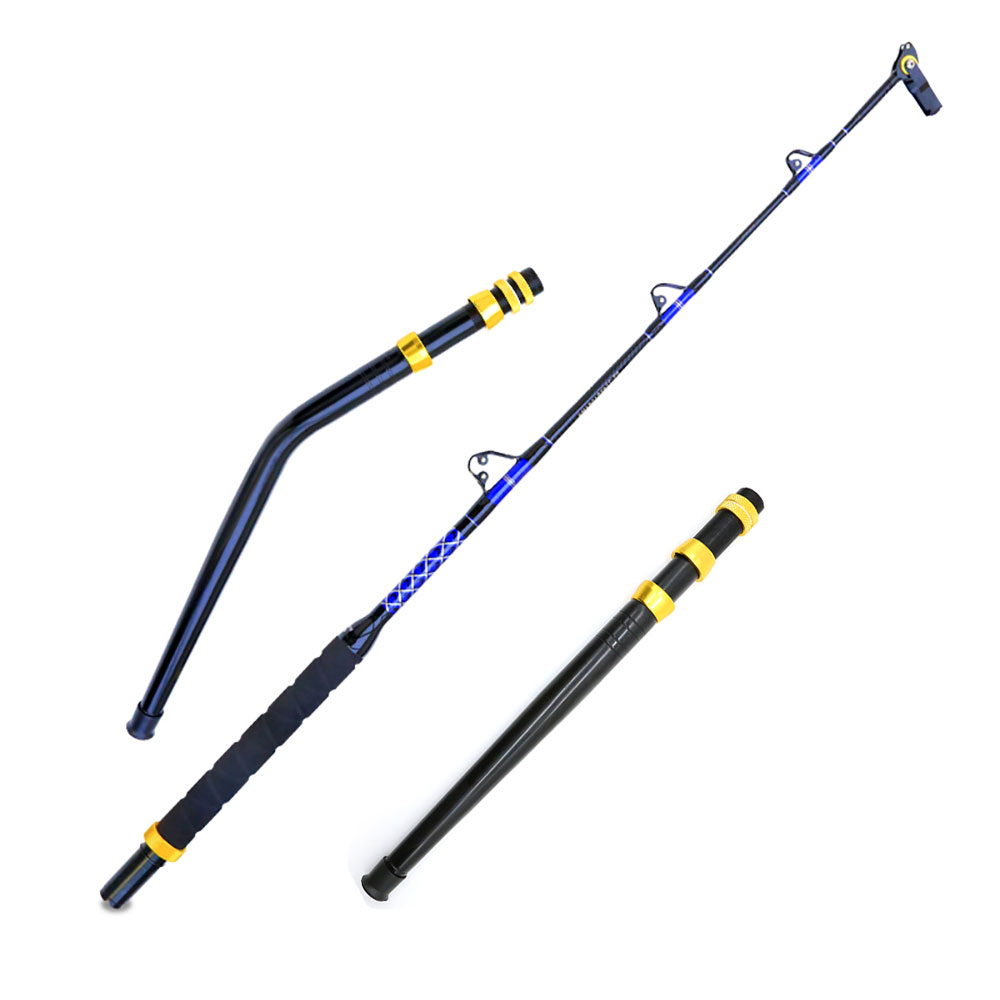Light tackle saltwater rods can be used in freshwater. Still, you would not want to use a freshwater rod in a saltwater environment because freshwater rods and fishing gear may not be made with the corrosion-resistant guides or components that saltwater rods are.
If you like to fish in salt and fresh water, you may want to know whether you can use saltwater fishing rods and reels to save money and space. What is the difference between the two? And why or why can’t they be used interchangeably? The short answer is yes, but not so simple. There are advantages and disadvantages of using saltwater fishing rods in fresh water. Before doing so, there are several factors to consider.
Differences Between Saltwater Fishing Rod VS Freshwater Fishing Rod
The difference between saltwater and freshwater fishing rods will mainly focus on the structure and materials of fishing rods.
When choosing the right seawater and freshwater fishing rod for your fishing adventure, you should consider the fishing techniques you plan to use. In other words, do you want to catch kingfish offshore or throw crankbaits in the local pond to catch largemouth bass? Once you consider the technique, you can view the size and intensity of your target species to select the appropriate fishing rod power.
According to different species, some saltwater fish (such as marlin or shark) can weigh thousands of pounds, meaning many saltwater fishing rods must be thicker and heavier than freshwater fishing rods.

Heavy offshore saltwater fishing rods are usually made of glass fiber, which is more durable. These fishing rods typically fall into the category of slow to moderate movements. As a general rule, the greater the curvature of the fishing rod, the slower the action.
Many freshwaters or inshore seawater fishing rods are made of graphite or a mixture of glass fiber and graphite (composite materials), making these fishing rods lighter and more sensitive. Graphite or composite fishing rods generally belong to the fast or ultra-fast action category.

The saltwater fishing rod generally belongs to one of three categories: spinning, bait casting, jigging, and trolling. For example, the offshore trolling rod will be shorter and more robust than the inshore spinning rod, because the offshore spinning rod is used for casting long-distance throwing in the backwater area.
If you want a multifunctional fishing rod, you can use it when fishing for inshore saltwater points and freshwater bass holes. You may choose a medium-power saltwater fishing rod with a rated line weight of 8-17 pounds. Light-weight saltwater fishing rods can be used in freshwater. Still, you don’t want to use freshwater fishing rods in saltwater environments, because freshwater fishing rods and fishing gear may not have corrosion-resistant guide rods or components like saltwater fishing rods.
Where Can You Use a Saltwater Rod
Saltwater fishing rods and reels are heavier than freshwater fishing rods and reels, which means you can use them in various places, not just in salt water. In the following section about freshwater fishing rods, we will discuss why you should not use freshwater fishing rods and reels in salt water because of their materials.

The saltwater fishing rod and reel can be used in various situations because they are straightforward and complex. They are made to withstand the corrosion of salt water, which means that they are made of special alloys or undergo special treatment.
If saltwater fishing rods are made of cheaper metal, they will be coated with a special sealant to keep the water on the metal and prolong its life. This makes the fishing rod lighter in weight and cost, but it can still play longer. However, over time, the sealant will start to fall off and may allow corrosion.
Can You Use a Freshwater Rod in Saltwater
If you can use a freshwater fishing rod in the sea at a critical moment, but I will rush home and wash it thoroughly after fishing to ensure that I enter every small gap in the reel seat, and pay special attention to the wire. Any salt you miss may shorten the life of the fishing rod to a fraction.
The saltwater fishing rod is designed to deal with spray from the waves and all the corrosive effects of the sea. They are usually coated with special materials to protect the fishing rod from damage. Similarly, the conductor is made of materials that can handle salt water. There is no guarantee that freshwater fishing rods will have these elements because manufacturers have no incentive to increase their costs without revenue.
Another risk is encountering bigger fish than your fishing rod can handle. The sea is a big place, and there are many videos of people fighting with big fish on the dock. Taking a freshwater fishing rod into the sea is like taking a knife to shoot a gun.
Freshwater fishing rods are made of cheaper and lighter materials than saltwater equipment. This leads to lower prices and weight, making them easier to bear and carry. This is because they are usually made of simple metal, which is good for fresh water.
Simple metals will slowly corrode over time, but they are cheap enough to be replaced every few years. However, if you use them in salt water, they will corrode faster unless they are coated with a sealant to prevent it.
Freshwater fishing rods are not usually intended to be used with more advanced saltwater reels. Many of these poles are used to throw monster fish in the deep sea on ships. You can’t do this with a freshwater fishing rod.
Conclusion about Using a Saltwater Fishing Pole in Freshwater
Whether you are fishing in salt water or fresh water, it is important to choose the fishing rod that suits your needs. The saltwater fishing rod is designed to deal with harsh conditions and strong fish in the saltwater environment, while the freshwater fishing rod is designed for lighter and finer fishing in the freshwater environment. With this knowledge, you can choose the right fishing rod for your next fishing adventure.
FAQ about Using a Saltwater Fishing Pole in Freshwater
Q1:Why do Not Use a Freshwater Reel in Saltwater?
A: The freshwater reel is made of the same simple metal as the freshwater fishing rod. This leads to the same risk of corrosion as the fishing rod when used in salt water. Because of this, most saltwater reels use the same alloy and sealant as saltwater fishing rods. There is also a solution. Some saltwater reels have also appeared.
Q2:I am currently in freshwater but was thinking if it would be a good idea to get a saltwater rod that I can use for freshwater?
A: We sell them on our shop page, if you have special requirements, Topline will help you, you can contact us!
Q3:I am looking for a med/heavy rod at least 7’6 for shore fishing a freshwater reservoir where distance is critical to get to where the fish are.
A: You can definitely fish freshwater with an inshore rod. In any case, I prefer to use inshore rods because they tend to hold up better. From inshore to freshwater rods, the action and power are almost identical.
Q4:Where did you get your custom, Inshore Rod?
A: Qingdao Oriental Leader Leisure Products Company, was established in the early 1990s and has experienced more than 27 years in fishing tackle.

